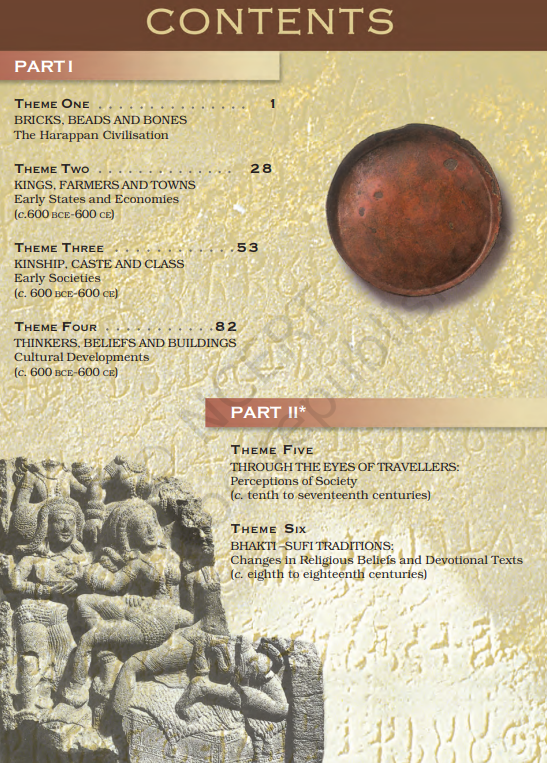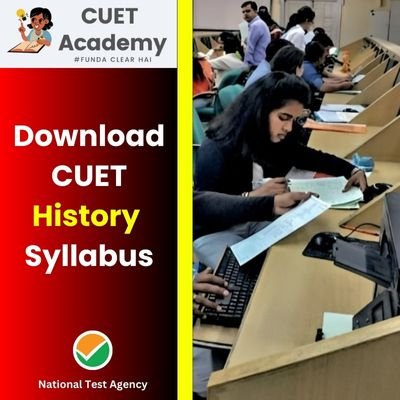In this blog, we will explore the CUET History Syllabus for 2024 exam. If you’re a 2024 CUET Aspirant and wondering what you’ll be studying for your History domain subject, you’ve come to the right place. We’ll break down the topics in a simple, easy-to-understand, and in best-detailed way, so you can get a clear idea about what’s in store for your computer science learning journey. This article aims to provide a detailed outline of the CUET History Syllabus for the 2024 Exam, along with engaging content and the previous year’s CUET History question paper to help you excel in the exam. Let’s dive in!
Call Now For FREE Classes: 93100-87900
NTA CUET History Exam Pattern For 2024 Exam
The CUET Examination will be conducted in a computer-based test (CBT) mode. The question paper will be strictly based on the NCERT syllabus for class 12 History
| Subjects | No. of questions to be attempted | Duration of the exam |
| Language (any one language out of 13 languages ) | 40 out of 50 questions. | 45 minutes for each language |
| Domain Subjects (maximum of 6 subjects from those 27 subjects) | 40 out of 50 questions. | 45 minutes for each subject |
| General Test | 60 Questions to be attempted out of 75 | 60 Minutes (1 hour) |
NTA CUET History Marking Scheme 2024
NTA has confirmed the exam pattern & the CUET marking scheme for the upcoming CUET exam in 2024. As per the official CUET notification, 5 marks will be awarded for every correct attempt, and 1 mark will be deducted for every incorrect attempt.
| Total Marks | 200 |
| Correct Answer | +5 |
| Wrong Answer | -1 |
| Unanswered | 0 |
Call Now For FREE Classes: 93100-87900
CUET History Syllabus For 2024 Exam (Detailed Syllabus)
A clear understanding of the syllabus is essential for success. Here, we break down the CUET History Syllabus 2024 exam in detail and provide you with a link to download the PDF version.
UNIT I: The Story of the First Cities Harappan Archaeology
| 1 | Broad overview | Early urban centers. |
| 2 | Story of discovery | Harappan civilization |
| 3 | Excerpt | Archaeological report on a major site. |
| 4 | Discussion | how it has been utilized by archaeologists/ historians |
UNIT II:: Political and Economic History: How Inscriptions tell a story
| 1 | Broad overview | Political and economic history from the Mauryan to the Gupta period. |
| 2 | Story of discovery | Inscriptions and the decipherment of the script. Shifts in the understanding of political and economic history. |
| 3 | Excerpt | Asokan inscription and Gupta period land grant. |
| 4 | Discussion | Interpretation of inscriptions by historians |
UNIT III: Social Histories using the Mahabharata
| 1 | Broad overview | Issues in social history, including caste, class, kinship, and gender |
| 2 | Story of discovery | Transmission and publications of the Mahabharata |
| 3 | Excerpt | The Mahabharata illustrates how it has been used by historians. |
UNIT IV: A History of Buddhism: Sanchi Stupa
| 1 | Broad overview | (a) A brief review of religious histories of Vedic religion, Jainism, Vaisnavism, Saivism. (b) Focus on Buddhism. |
| 2 | Story of discovery | Sanchi stupa |
| 3 | Excerpt | Reproduction of sculptures from Sanchi |
| 4 | Discussion | (a) A brief review of religious histories of Vedic religion, Jainism, Vaisnavism, and Saivism. (b) Focus on Buddhism. |
Unit V: Medieval society through Travellers’ Accounts
| 1 | Broad overview | A discussion of where they travelled, why they traveled, what they wrote, and For whom they wrote |
| 2 | Story of discovery | A discussion of where they traveled, why they traveled, what they wrote, and For whom they wrote |
| 3 | Excerpt | from Alberuni, Ibn Batuta, Bernier. |
| 4 | Discussion | What these travel accounts can tell us and how they have been interpreted by historians. |
Unit VI: Religious Histories: The Bhakti-Sufi Tradition
| 1 | Broad Overview | (a) Outline of religious developments during this period. (b) Ideas and practices of the Bhakti-Sufi saints. |
| 2 | Story of discovery | How Bhakti-Sufi compositions have been preserved. |
| 3 | Excerpt | Extracts from selected Bhakti Sufi works. |
| 4 | Discussion | Ways in which these have been interpreted by historians. |
Unit VII: New Architecture: Hampi
| 1 | Broad Overview | (a)Outline of new buildings during Vijayanagar period — temples, forts, irrigation facilities. (b)Relationship between architecture and the political system. |
| 2 | Story of discovery | Account of how Hampi was found |
| 3 | Excerpt | Visuals of buildings at Hampi |
| 4 | Discussion | (a)Outline of new buildings during the Vijayanagar period — temples, forts, irrigation facilities. (b)Relationship between architecture and the political system. |
Unit VIII: Agrarian Relations: The Ain-i-Akbari
| 1 | Broad Overview | (a) Structure of agrarian relations in the 16th and 17th centuries. (b) Patterns of change over the period. |
| 2 | Story of discovery | Account of the compilation and translation of Ain-i-Akbari. |
| 3 | Excerpt | From the Ain-i-Akbari |
| 4 | Discussion | Ways in which historians have used the text to reconstruct history. |
Unit IX: The Mughal Court: Reconstructing Histories through Chronicles
| 1 | Broad Overview | (a) Outline of political history c. 15th-17th centuries. (b) Discussion of the Mughal court and politics. |
| 2 | Story of discovery | Account of the production of court chronicles, and their subsequent translation and transmission. |
| 3 | Excerpt | from the Akbarnama and Padshahnama. |
| 4 | Discussion | Ways in which historians have used the texts to reconstruct political histories. |
Unit X: Colonialism and Rural Society: Evidence from Official Reports
| 1 | Broad Overview | (a) Life of zamindars, peasants, and artisans in the late 18th century. (b) East India Company, revenue settlements, and surveys. (c) Changes over the nineteenth century |
| 2 | Story of official records | An account of why official investigations into rural societies were undertaken and the types of records and reports produced. |
| 3 | Excerpt | From Firminger’s Fifth Report, Accounts of Francis Buchanan-Hamilton, and Deccan Riots Report |
| 4 | Discussion | What the official records tell and do not tell, and how they have been used by historians. |
Unit XI: Representations of 1857
| 1 | Broad Overview | (a) The events of 1857-58. (b) How these events were recorded and narrated. |
| 2 | Focus | Lucknow |
| 3 | Excerpt | Pictures of 1857. Extracts from contemporary accounts. |
| 4 | Discussion | How the pictures of 1857 shaped British opinion of what had happened. |
Unit XII: Colonialism and Indian Towns: Town Plans and Municipal Reports
| 1 | Broad Overview | The growth of Mumbai, Chennai, hill stations, and cantonments in the 18th and 19th centuries. |
| 2 | Excerpt | The growth of Mumbai, Chennai, hill stations, and cantonments in the 18th and 19th century. |
| 3 | Discussion | How the above sources can be used to reconstruct the history of towns. What these sourcesdo not reveal. |
Unit XIII: Mahatma Gandhi Through Contemporary Eyes
| 1 | Broad Overview | (a) The nationalist movement 1918-48, (b) The nature of Gandhian politics and leadership. |
| 2 | Focus | Mahatma Gandhi in 1931. |
| 3 | Excerpt | Reports from English and Indian language newspapers and other contemporary writings |
| 4 | Discussion | How newspapers can be a source of history. |
Unit XIV: Partition through Oral Sources
| 1 | Broad Overview | (a) The history of the 1940s; (b) Nationalism, Communalism and Partition |
| 2 | Focus | Punjab and Bengal. |
| 3 | Excerpt | Oral testimonies of those who experienced partition. |
| 4 | Discussion | Ways in which these have been analyzed to construct the history of the event. |
Unit XV: The Making of the Constitution
| 1 | Broad Overview | (a) Independence and the new nation state. (b) The making of the Constitution. |
| 2 | Focus | The Constitutional Assembly debates. |
| 3 | Excerpt | From the debates. |
| 4 | Discussion | (a) Independence and the new nation-state. (b) The making of the Constitution. |
Call Now For FREE Classes: 93100-87900
NCERT History Textbook Class 12th for 2024 CUET Exam


Call Now For FREE Classes: 93100-87900
NTA CUET History Syllabus 2024 PDF Download
The NTA (National Testing Agency) conducts the CUET (Common University Entrance Test) to assess students’ historical abilities for various university admissions. By providing the History syllabus in a downloadable PDF format, we aim to make it convenient and time-saving for aspiring students like you to access and prepare for the CUET Exam 2024 thoroughly.
Download PDF:- NTA CUET History Syllabus 2024
FAQ: CUET History Syllabus For 2024 Exam
How to manage class 12th boards and CUET 2024?
There is nothing to manage between both of them, the syllabus for 12th boards 2024 and CUET 2024 is almost the same, what you have to do is study the NCERT Class 12th Textbooks by heart. After completing the syllabus, practice subjective-type questions for boards and objective-type questions for CUET 2024.
What are the essential tips to prepare for the CUET History Syllabus 2024?
To prepare effectively, start by understanding the syllabus outline and allocating sufficient time to each topic. Use study materials from credible sources and make use of sample question papers and mock tests to gauge your preparation level.
Is History Domain Subject tough in CUET?
No, for a student having history subjects in 12th, then the history domain subject in CUET 2024 is not at all challenging. You need to stick to NCERT Class 12th History Textbook and practice hard.
How can I improve my essay writing skills for the history section?
Regularly practice writing essays on historical topics, analyze sample essays, and seek feedback from teachers or mentors. Focus on structuring your essays logically and presenting well-researched arguments.
How important is it to practice time management during the exam?
Time management is crucial as the test duration is limited. Practice solving CUET previous year’s question papers within the specified time frame to improve your speed and accuracy.
Call Now For FREE Classes: 93100-87900

